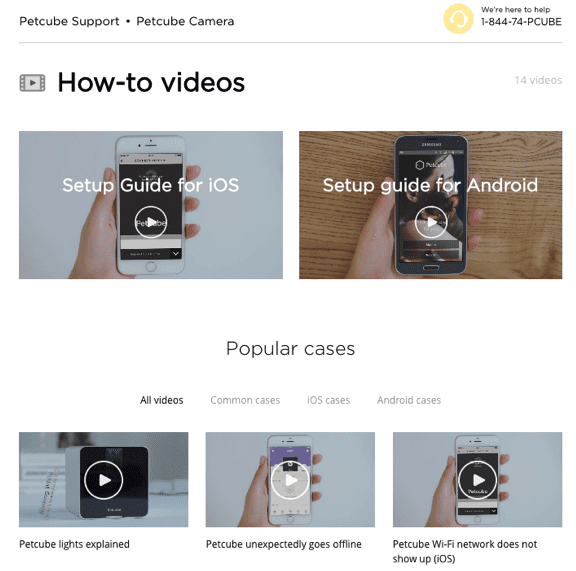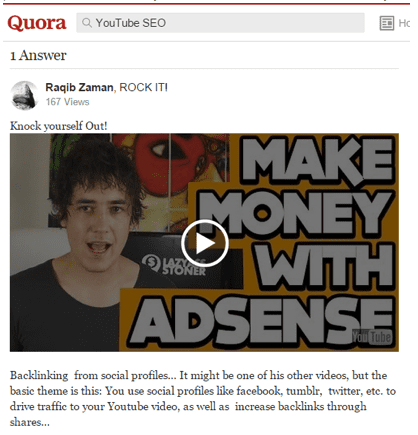Video can help you take your digital marketing results to the next level
Content has always been a king and video content is king in 2017. According to a new report from Cisco, by 2019, online videos will generate four-fifths of global internet traffic. To be ready check the tips and cases below to get a clear idea of how, where and why you should implement video in your digital marketing strategy.
On your website
The video takes more time and resources than text, but 79% of customers say they'd rather watch a video to learn about a product than reading text on a page. 84% said that they'd been convinced to make a purchase after watching a video.
How to get results with SEO
- Make short video reviews on product landings. 97% of businesses said that their video tutorials and short videos about their features helped increase user understanding of their products or services.
- Replace the text with the video tutorials in the blog and the support page. Over half (53%) of businesses said that video has helped them reduce the number of support calls.

- Use the user-generated content to get regular video content without spending your resources on it. Offer users a discount or a gift in return for a video review.
What to expect:
On Q&A platforms like Quora
Ever used video content to populate discussions or comments on the platforms like Quora or Yahoo! Answers? Let me show you what you can potentially achieve while enhancing these texts with videos. (Bear in mind - Quora is included in TOP 500 by Alexa).
How to get results
You can spam discussions with the links to your website which most likely will result in you being expelled from the site. Or you can place links to your YouTube channel and win. Q&A websites like video a lot. Plus, you will be posting video answers which people genuinely prefer. Just add a link to your website in the video - and watch your traffic grow.

What to expect:
Mainly the significantly increased traffic generated through:
- 100M unique monthly visitors on Quora
- 15M users visiting Yahoo Answers daily
In emails
According to Conductor research, 51% of people discover new websites through email. Unfortunately, the majority of email providers don't support videos in emails. But using the word “video” in the email subject lines boosts open rates to 19%, click-through rates to 65%, and reduces unsubscribes by 26%. So take advantage of it with some of the techniques below.
How to get results
There are 3 ways for using video in the email:
- Risky way. Include the video in the email’s <body> using html5. And send it knowing ahead of the time that only iOS, Outlook.com, Apple Mail and Thunderbird users will be able to see it. Gmail, Yahoo and Outlook don’t support videos.
- Creative way. Use GIFs. It is an option if you want your video to be displayed in all popular email clients (except Outlook 2007-2013 and Windows Phone mail). It looks better than static images and clearly shows that you refer to the video. And it’s pretty simple to convert video to gif with ImgFlip, GifLike or GifSoup.
- Classic way. Use a static picture or a screenshot with the “PLAY” button. Send the user to your landing page (not YouTube) where you’ve embedded the video to receive the traffic.
What to expect:
Via social media
Social media are evangelists of the video trend. Live, 360, VR, LIVE 360 and other technologies greatly benefited from being tested there.
In 2016 Facebook and Snapchat received 8 and 7 billion video views daily. Instagram users uploaded more than 5 million videos during the first 24 hours of function availability. Seems like social media and video will become the synonyms soon.
How to get results
It’s vital to quickly react to the new video trends and analyze your audience response. The infographics show the most liked trends by marketers.
What to expect
7 times more Facebook shares and 6 times retweets. It’s pretty good, considering the importance of social signals for ranking.
Via YouTube
According to the Tubular insights, 68% of YouTube users watched YouTube to make a purchasing decision.
The product reviews trend continues to gain momentum, both for bloggers and advertisers. In addition, Google "loves" YouTube (of course — their own product), so in 20% rich snippets appears the video.
How to get results
1) Follow trends in YouTube. Use free tools like Trends Map; Trends Dashboard; Trends blog.
2) Find “video-keywords” that have YouTube results on the first page of Google. It usually sounds like:
- How to (“How to become friends with my girlfriend’s cat”);
- Reviews (“Samsung Galaxy S8 review”);
- Tutorial (“Setting up Windows on Mac”);
- Sport-related topics (“Morning yoga”);
- Funny and cute video (“Cute cats”)
3) Use the keyword in the video’s filename. It’s important to use it in the Title and Description as well. Include your keyword in the first 25 words and repeat 3-4 times.
4) Add links to your site and social profiles to the description.
5) Allow comments. Active discussions are good signals for search engines.
6) Check the video positions to analyze which videos are better ranked and why.
Also pay attention to:
Mobile. In 2012-2014 mobile video views rate has increased by 400%. Today 48% of millennials watch videos solely on their mobile devices. That is the reason your website, emails, videos embedded on your pages should be optimized for smartphones.
Speed. When adding videos to your website make sure that the page load time doesn’t increase. For example, Walmart chalks up an extra 2% conversions with every second of speed improvement.
Friendly tone. Now we're seeing a move away from the formal 'radio voice' that's always been so widespread. And 83% of consumers reported finding an informal voice-over track that sounded like a friend or a family member, adding trust and a sense of connection to the communication.

Julia Karnaux is a Head of Marketing at
SE Ranking – all-in-one SEO platform that provides a set of tools for SEO gurus, digital agencies, online marketers and website owners and accommodates any project, any level, any project.





 Julia Karnaux is a Head of Marketing at
Julia Karnaux is a Head of Marketing at 


